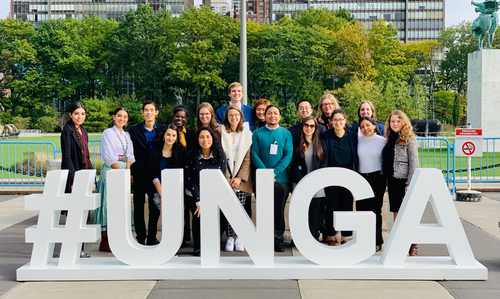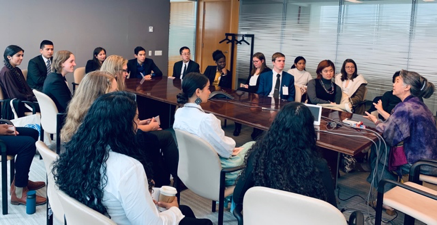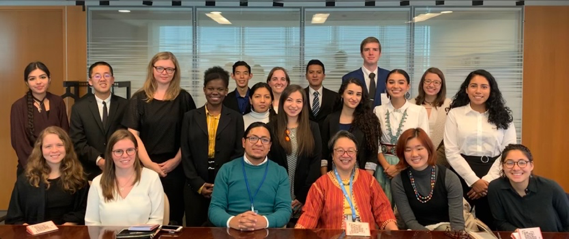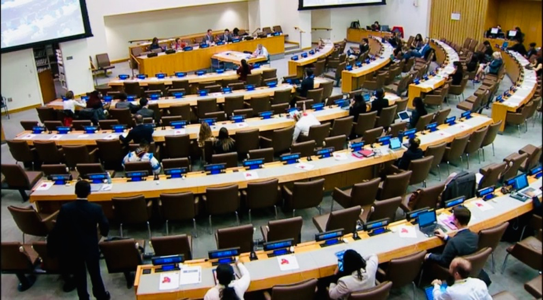Yale Delegation Visits U.N. for Indigenous Peoples Program

On October 11, a group of Yale students, including many Native students from the Native American Cultural Center (NACC), visited New York City as part of the United Nations and the Rights of Indigenous Peoples Series (UNRIPS). This initiative concerns the promotion and protection on the rights of indigenous peoples at the international level. It was led by Diego Tituaña, 2019 Maurice R. Greenberg World Fellow and Ecuadorian diplomat, who has taken on an active role within the Y.G.S.N.A. community during his fellowship.
Before the visit to the UN, the sixteen students selected participated in two preparatory workshops on campus, on October 4 and October 9, during which they learned about the United Nations Mechanism on Indigenous Peoples. One session was led by Professor Elsa Stamatopoulou, who directs the Indigenous Peoples Rights Program at Columbia University and who formerly served as chief of the Secretariat of the Permanent Forum on Indigenous Issues at the UN.

The last session of UNRIPS took place at the United Nations Headquarters, in which the participants had the opportunity to meet with Chandra Roy-Henriksen, chief of the Indigenous Peoples and Development Branch at the UN Division for Inclusive Social Development; Myrna Cunningham, board member of the UN Voluntary Fund for Indigenous Peoples and chair of FILAC; andVictoria Tauli-Corpuz, special rapporteur on the Rights of Indigenous Peoples.The Yale students also had the opportunity to observe the Third Committee of the General Assembly in action, attending the session debate on the agenda item of the rights of indigenous peoples.

According to Tituaña, “the initiative aims at enhancing Yale students’ understanding of the protection and promotion of indigenous peoples’ rights at the multilateral level and, as a result, to integrate this knowledge more fully and effectively into their academic development.” The program was sponsored by the Yale Maurice R. Greenberg World Fellows Program, the N.A.C.C., Y.G.S.N.A., the Council on Latin American and Iberian Studies at Yale’s MacMillan Center, the Ethnicity, Race, & Migration Program at Yale, and the Yale Center for the Study of Race, Indigeneity, and Transnational Migration.
 For sophomore Alie Brussel Faria, “UNRIPS was an incredible and unique experience. The workshops and the trip exposed me directly to the global mechanisms that support the rights of Indigenous Peoples. There are no similar programs at Yale.” Another student participating in the trip, José Guerrero Razo, mentioned, “Tome the best part was being exposed to the issues of Indigenous communities around the world and seeing how different countries are collaborating to come up with solutions. In addition, it was very exciting to be able to see how different United Nations mechanisms operate and to be able to sit in on a real General Assembly session.”
For sophomore Alie Brussel Faria, “UNRIPS was an incredible and unique experience. The workshops and the trip exposed me directly to the global mechanisms that support the rights of Indigenous Peoples. There are no similar programs at Yale.” Another student participating in the trip, José Guerrero Razo, mentioned, “Tome the best part was being exposed to the issues of Indigenous communities around the world and seeing how different countries are collaborating to come up with solutions. In addition, it was very exciting to be able to see how different United Nations mechanisms operate and to be able to sit in on a real General Assembly session.”
A reflection and follow-up meeting of UNRIPS was held on October 30, in which the students expressed their satisfaction for having had the opportunity to learn about the practical experiences of key actors in the field of the rights of Indigenous Peoples and to be part of a UN debate session. Students expressed their support and underlined the importance of continuing the program and workshop in the coming years.